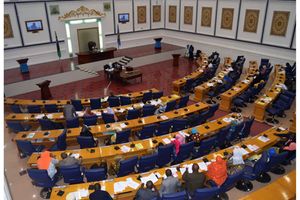Two million hectors targeted for irrigation by 2025

The acting director general of the National Irrigation Commission (NIC), Mr Seth Luswema
What you need to know:
The acting director general of the National Irrigation Commission (NIC), Mr Seth Luswema said the plan would be achieved through reviving stalled irrigation projects, covering about 456,000 hectors.
Arusha. The government intends to have at least two million hectares under irrigation by 2025.
The acting director general of the National Irrigation Commission (NIC), Mr Seth Luswema said the plan would be achieved through reviving stalled irrigation projects, covering about 456,000 hectors.
"Also, efforts have to be made to increase the commission’s capacity by recruiting qualified personnel and inventing the new technologies", he added.
Mr Luswema was speaking during the handing over of a Sh960 million civil and irrigation engineering project to the Arusha Technical College (ATC) by the Japan International Cooperation Agency (Jica).
The hand over was graced by the Jica representative to Tanzania, Mr Satoru Matsuyama at the 25 acre Oljoro demonstration farm at the outskirts of Arusha.
"It is now the turn of the ATC to ensure the programme is sustainable," he said, urging the college management to take the responsibility.
He said irrigation held the future of the Tanzania's agricultural production, noting that irrigation engineering was one of the new courses recently introduced by the college.
Mr Matsuyama added that “Also, this will be accomplished through reviving some of the stalled irrigation projects covering about 456,000 hectares across the country. “
The acting ATC rector, Dr Masudi Senzia said a total of 234 students have graduated in civil and irrigation engineering since the course was introduced in 2010.
The multi-million shilling irrigation project run by the Arusha College kicked off in 2014 with the support of the Japanese government through Jica.
It aims at capacity building for the college staff who would be involved in training of civil and irrigation engineering.
A modern hydraulics laboratory costing about $400,000 and part of the project was launched last year at the college campus. It will be used for practical.




